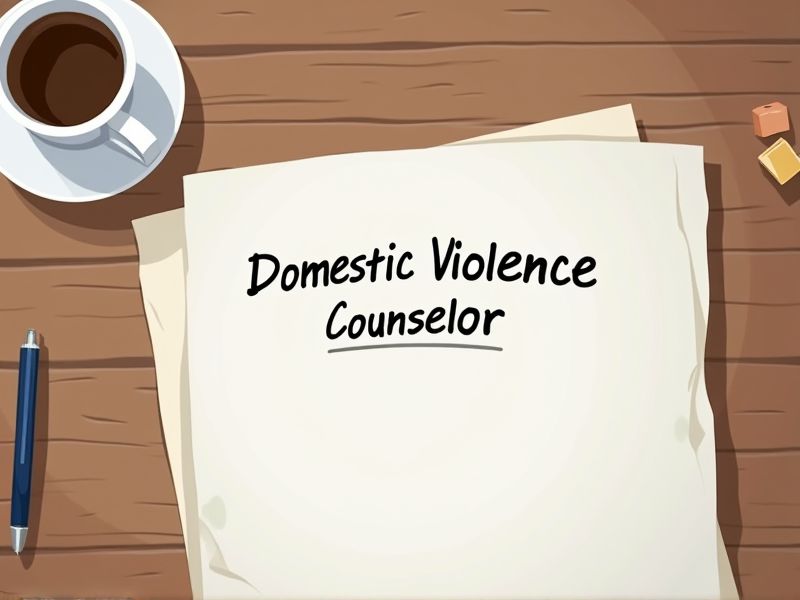
Domestic Violence Counselors require specific certifications due to the sensitive and complex nature of their work, which involves supporting individuals in crisis and helping them navigate legal and emotional challenges. These credentials ensure counselors possess specialized knowledge in dealing with trauma, understanding legal frameworks, and offering effective support strategies. Certifications also build trust with clients, as they signal professional competence and commitment to ethical standards. Among the essential credentials for a Domestic Violence Counselor are these key certifications.
Certified Domestic Violence Professional (CDVP)
Certified Domestic Violence Professionals are essential because they provide specialized knowledge that ensures the safety and proper support of survivors. Without certification, counselors might lack the necessary skills to effectively navigate the complexities of domestic violence cases. Certification also establishes a standard of care, ensuring that professionals are equipped with up-to-date practices and regulations. Ensuring such expertise can directly impact the efficacy of intervention and prevention efforts in domestic violence situations.
Certified Domestic Violence Advocate (CDVA)
Certified Domestic Violence Advocates provide specialized training and knowledge that enhance the effectiveness of support for survivors, increasing their chances for recovery and empowerment. The CDVA credential ensures counselors have the latest legal and safety planning strategies, which are crucial for navigating complex domestic violence cases. Advocates help bridge gaps between survivors and necessary resources, facilitating access to shelters, legal aid, and mental health services. They also contribute to a trauma-informed approach, promoting environments that are sensitive to the emotional and psychological needs of clients.
Trauma-Informed Care Certification
Trauma-Informed Care Certification equips domestic violence counselors with the knowledge to recognize and respond to trauma symptoms effectively. Understanding trauma's impact on survivors helps create a safer and more supportive counseling environment. Informed counselors can tailor their approaches to reduce re-traumatization and promote healing. This certification enhances the counselor's ability to advocate and empower survivors, improving overall outcomes.
Crisis Intervention Certification
Crisis Intervention Certification equips domestic violence counselors with essential skills to assess and respond effectively in high-stress situations, ensuring victim safety. Certified counselors are better prepared to de-escalate potentially dangerous scenarios, which can reduce the risk of harm. The certification also provides knowledge on legal and ethical standards, crucial for maintaining professional credibility. It enhances counselors' ability to offer comprehensive support, increasing the likelihood of positive outcomes for those affected by domestic violence.
Mental Health First Aid Certification
Mental Health First Aid Certification equips domestic violence counselors with essential skills to identify and address mental health crises that often accompany abuse. It enhances their ability to provide immediate support, reducing the risk of escalation in crisis situations. Knowledge from the certification fosters a better understanding of conditions like PTSD, depression, and anxiety, which are prevalent among survivors. Certification ensures standardized care, promoting a safer and more empathetic counseling environment.
Substance Abuse Counseling Certification
Substance abuse often intersects with domestic violence, as individuals experiencing one may also struggle with the other, necessitating comprehensive understanding in both areas. A certification in Substance Abuse Counseling equips counselors with knowledge to address addiction issues that might exacerbate violent behaviors. Effective counseling requires addressing root causes; thus, understanding substance abuse dynamics can enhance intervention strategies. Professionals with this certification can provide more holistic care, improving outcomes for both victims and perpetrators.
Child Abuse and Neglect Prevention Certification
Child abuse and neglect often co-occur with domestic violence, requiring counselors to have the knowledge to recognize and address these interconnected issues effectively. Certification equips domestic violence counselors with the necessary skills to identify signs of abuse and ensure the safety of vulnerable children. Counselors with this certification can offer more comprehensive support, addressing the broader dynamics affecting families. Certification can enhance a counselor's credibility and trust with clients, facilitating better intervention outcomes.
Certified Counselor License (e.g., LPC, LMFT)
A Certified Counselor License ensures that a domestic violence counselor has met the necessary educational and ethical standards, safeguarding the welfare of clients. Possessing credentials like LPC or LMFT demonstrates specialized training in mental health issues, which is crucial when addressing the complexities involved in domestic violence cases. The licensing process includes a thorough assessment of the counselor's skills and theoretical knowledge, ensuring they are equipped to provide competent support. Holding a recognized certification builds trust with clients and agencies, increasing the likelihood of successful intervention.
Domestic Violence Mediator Certification
Domestic violence mediator certification equips counselors with specialized skills to effectively facilitate conflict resolution in high-tension situations. Trained mediators possess a deeper understanding of the power dynamics and psychological effects prevalent in domestic violence cases. This certification ensures that counselors can uphold safety and neutrality while supporting both parties involved. Enhanced mediator skills directly contribute to more positive outcomes in domestic violence interventions, fostering safer environments.
Cultural Competence in Social Services Certification
Cultural competence in social services certification ensures domestic violence counselors understand diverse cultural backgrounds, which improves client trust and communication. Without proper cultural understanding, counselors might overlook critical cultural nuances, potentially leading to ineffective interventions. Certification equips counselors with skills to recognize how cultural factors influence domestic violence dynamics and client responses. Enhanced cultural awareness enables counselors to develop more tailored and effective support strategies for victims from varied cultural contexts.
Summary
As a reader, understanding that a Domestic Violence Counselor obtaining certifications can enhance their credibility and professional standing is crucial. This certification often leads to improved counseling skills and a deeper understanding of the complexities surrounding domestic violence cases. The specialized training can increase the counselor's ability to create effective intervention strategies and provide more robust support to victims. Overall, this certification equips counselors with the tools necessary to significantly impact their clients' journey towards safety and healing.
